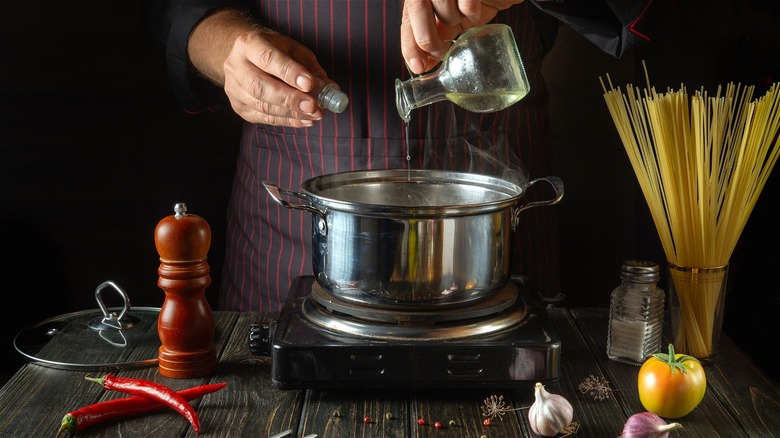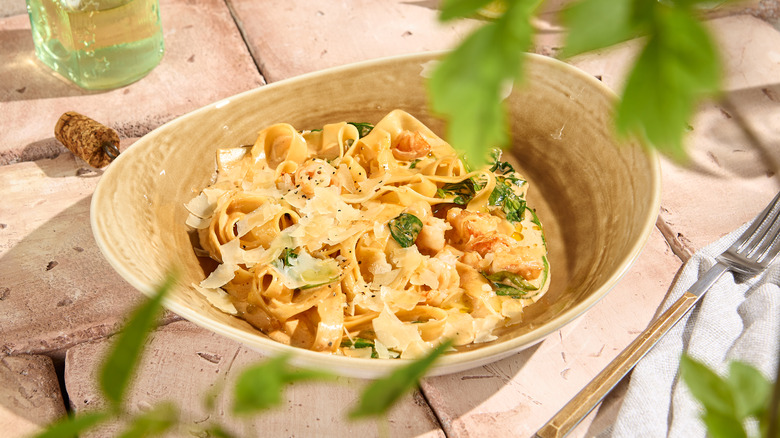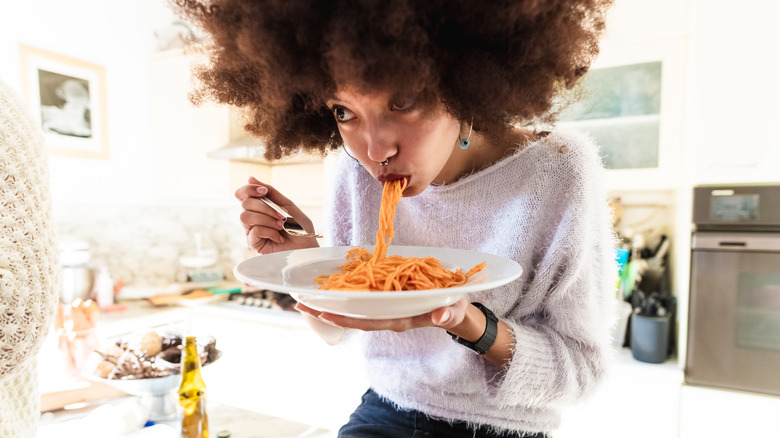Why You Should Think Twice Before Adding Olive Oil To Pasta Water
There's little better in the culinary universe than perfectly cooked pasta. However, there's so much advice out there on how to make this staple food — from adding salt to cooking in stock or broth to when to add the pasta, when to remove it, how much water to add, and so on. One of the debates perpetually raging across the interweb is whether or not you should add olive oil to your pasta water.
While many chefs will balk at the idea (and for good reason), others claim it can help with flavor and texture. Also, a little olive oil will add a layer across the top of the water, preventing balloon-like monster starch bubbles from forming and causing the pot to boil over.
It's generally agreed that adding olive oil to your pasta water will stop your starchy strands from sticking. However, while this may be true, doing this will have the counter effect of coating your pasta in a layer of fat, making it so slick that none of the sauce will stick to it. And what's the point of cooking pasta if it's not slathered in a creamy Alfredo or tangy tomato sauce?
Olive oil prevents sauce from sticking to your pasta
It's no secret that oil and water do not mix because oil is less dense than water. As a result, oil forms a separate layer on top of water, and while this layer may prevent the pot from boiling over, the oil will cling to the soft pasta when you pour the noodles out in a colander.
Most pasta is porous. So, when oil gets its greasy mitts in there, it clogs the pores of the pasta forming a slick layer preventing anything else from sticking to it, like, um, the sauce. So instead of lining your pasta in a lovely even layer, the sauce will likely slip to bottom of your bowl leaving your extra greasy pasta sauce-free. Not ideal.
It's actually much easier to stop your pasta from sticking together than you might think. Just pop a generous pinch of salt in the pan, and as the water comes to a boil, stir periodically as it cooks. You'll notice a slight stickiness after you drain the pasta, which is a good thing because that helps the sauce cling.
Olive oil in water unbalances the sauce recipe
So, you've spent hours poring over the exact measurements of ingredients in your grandma's pasta sauce recipe, which may include a secret spice you should be adding (that's not garlic powder). Your sauce will likely include olive oil in the ingredient list, especially if you're making a Bolognese with pasta recipe. If you've added another dash of olive oil to the water that has covered your pasta, you're adding more oil to the sauce recipe. The result will be a greasy mess of over-oiled pasta sauce — grandma would not be pleased.
In addition, you may have noticed while shopping for olive oil in your local supermarket that it's not cheap. The price of what some call "liquid gold" has increased 112% since 2022. And, the cost a 750-milliliter bottle went from $9 to $11 between 2022 and 2023, that's a 22% increase in one year. Why waste such a precious commodity?
So, given that olive oil in your pasta water will make the dish too oily, repel the sauce, and add extra fat, you're also literally throwing money away. If you want to add a drizzle of olive oil, the best option for added flavor is just before you're about to serve. Buon appetito!


